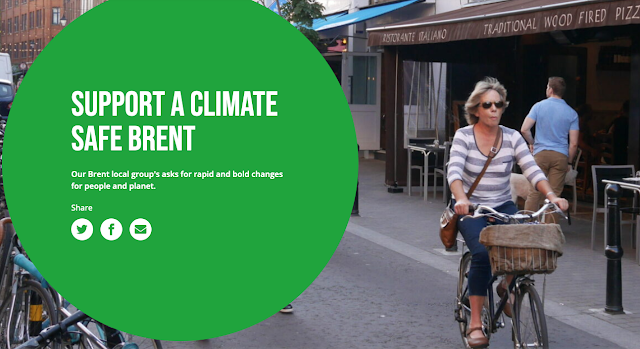From Brent Cycling Campaign
London Cycling Campaign (LCC)
has released a new report on borough and Mayoral progress on delivering on
‘Climate Safe Streets’ – schemes designed to decarbonise roads transport, boost
walking & cycling rates and cut motor vehicle use.
The ‘Climate Safe Streets: One
Year On, One Year To Go’ report names the boroughs doing best and worst on
decarbonising their roads, with borough leaders one year into their current
term and with the Mayor having one year to go in his. It tracks London’s
progress by assessing action the boroughs and Mayor have taken in line with
LCC’s Climate Safe Streets campaigning and makes use of key data on transport
mode shift away from private motor vehicles over the last decade too.
Prior to the 2022 local council
elections, LCC members and activists in Brent asked the council leader to
commit to delivering on a set of specific schemes to enable more people to walk
and cycle in the borough and to shift the borough away from private motor
vehicle use (wherever possible) and the climate-changing emissions, road
danger, inactivity and pollution they cause. Brent 'Asks'.
Party responses to request for pledges in the May 2022 Brent Council Elections:
The report released yesterday by the LCC in conjunction with its
local group Brent Cycling Group, says the following about Brent council’s
progress over the last year:
Given that the current council
leader Muhammed Butt, not only has committed to climate targets for the entire
borough of 2030 – marking it out as one of London’s bolder boroughs –it’s quite
startling to see the gulf here between the talk and actions. Brent is failing
to deliver on just about every sensible approach to roads transport
decarbonisation going. It will need to do far, far more and far faster than
rely on TfL to deliver one short cycle route to enable active travel, or
commercial providers to roll out freight mode shift.
PROGRESS IN BRENT
Sylvia Gauthereau, of Brent
Cycling Campaign said.
It’s disappointing to see the
lack of meaningful action and lack of emergency over climate action in Brent.
The tendency for the Council to over rely on everyone else, may it be TfL or
community groups to lead, is more evidence that the political will is just not
there despite ambitious, electoral promises. The fragmented and slow-paced
approach is no longer suitable given how time sensitive tackling road decarbonisation
is. The time to do something bold is now.
Four boroughs are failing to
deliver any real ‘Climate Safe Streets’ for residents in their boroughs. In descending
order of mode shift away from private motor vehicles pre-pandemic, they are:
- Tower Hamlets
- Bromley
- Hillingdon
- Bexley
Tower Hamlets is the only
London borough where a higher proportion of journeys were being made using
private motor vehicles before the pandemic than a decade ago (mode share rose
by over 4%). The inner London borough has very low levels of car ownership, but
did nothing to constrain car use pre-pandemic. And since the local elections,
Tower Hamlets has elected a Mayor on a manifesto of ‘reopening roads’ by
removing active travel and car restriction schemes.
The remaining boroughs
12 further boroughs are
significantly behind on delivering schemes asked for by LCC’s ‘Climate Safe
Streets’ campaign (beyond the already-named bottom four). Of these, the leaders
of both Greenwich and Kingston Upon Thames councils both made full commitments
to LCC’s campaign ‘asks’ prior to the local council elections but are thus far
failing to deliver on those commitments. (Barking & Dagenham, Barnet,
Brent, Croydon, Ealing, Hammersmith & Fulham, Harrow, Kensington &
Chelsea, Redbridge and Sutton are all significantly failing to deliver on Climate
Safe Streets schemes).
LCC’s report provides specific
recommendations to the leadership for each London borough to help them get on
track delivering on roads transport emissions, against their climate emergency
declarations (in London, only Bexley and Bromley appear to have not declared an
‘emergency’).
Mayoral delivery
As well as assessing the
boroughs’ progress to delivering ‘Climate Safe Streets’, LCC’s report also
assesses the London Mayor’s progress.
The good news is the Mayor of
London’s commitment to a ‘Vision Zero’ of eliminating serious and fatal
collisions from London’s roads by 2041 is broadly on track – likely due to the
roll-out of 20mph zones, active travel schemes and the Met Police’s increasing
speed enforcement (the Met is due to enforce 1 million speeding offences
annually by 2024). However, improvements to dangerous junctions remain slow to
roll out, and the Mayor’s self-set target of making London ‘Net Zero’ on
climate emissions by 2030, requiring a 27% cut in road km driven according to
his team, is not on target. Vehicle km driven were rising pre-pandemic, private
motor vehicle mode share was not coming down fast enough and patchy delivery by
boroughs remains a serious issue.
LCC’s recommendations from the
report are that the Mayor must accelerate his programme, particularly ensuring
ULEZ expansion set for August is not delayed or weakened, get bolder on the
schemes and roads he has direct powers over, and solve the current siloed
working inside TfL in favour of schemes that deliver for buses and active
travel.
Simon Munk, Head of Campaigns, London
Cycling Campaign
We need a lot more boroughs delivering
‘Climate Safe Streets’ like Hackney and Waltham Forest and fewer, like Tower
Hamlets and Bromley, failing to deliver as our new report shows. Every London
council and the Mayor must deliver more streets fit for cycling, walking and
children playing, and faster, if we’re to help London escape the grip of car
dependency and the cost of living crisis. Our new ‘One Year On, One Year To Go’
report highlights what needs to be done, for future generations, and to make
London now a better city today.
The full report can be read and downloaded HERE,















